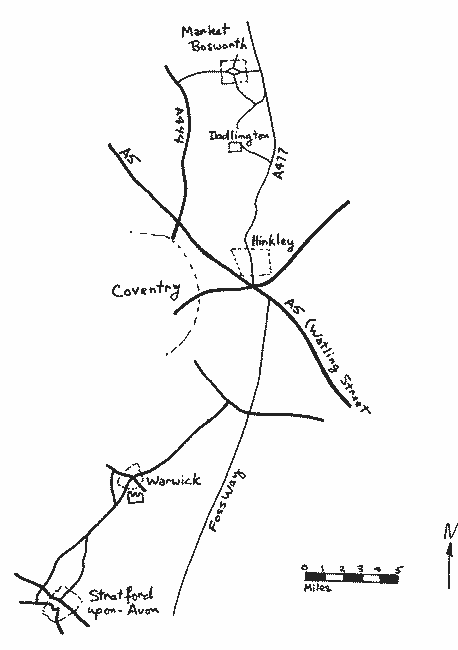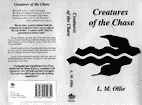 |
|
| Home Page • Creatures • King Richard III • Author's Page • Where to Buy • Contact | |
Quick Links:On The Trail of King Richard III. The book that started it all. The Virtual tour of Medieval England based on the book. The Visitor Centre - Facts and Information about Medieval life and times. Map for Day 11 |
Stratford-Upon-Avon"What do you know about Shakespeare’s private life?" Laura asked as she eased the car into fifth gear. Gail shrugged. "Not much I guess beyond the fact that he was married to Anne Hathaway, had children and is buried somewhere in Stratford." "Did you know that Anne was three months pregnant when she married Will, and she was eight years older than he was? She was twenty-five and he was a mere lad of seventeen. Talk about robbing the cradle! She was also illiterate." "That’s odd." "I agree. There’s little doubt that from the Shakespeare family perspective, their son Will was marrying beneath himself. His first child, a daughter Susanna, was born in May 1583; almost exactly 100 years from the date Richard was embroiled in the mess created by his brother’s untimely death. Twins were to follow two years later, a boy and a girl - Hamnet and Judith. In about 1587 Shakespeare headed for London, virtually abandoning his family for his art and the theatre. You know he was just as much an actor as a playwright? Anyhow, by degrees he succeeded in both professions. Writing must have come easily for him because it is said that his manuscripts contained little or no changes, edits, scribbles. Being an actor helped no doubt because he knew what pleased the Elizabethan audience. Same formula as today really - sex, violence, sex, intrigue, more sex, witchcraft and the supernatural and of course love, requited or otherwise. He visited his family from time to time but, sadly it was while he was on tour in Kent, I think, when his only son and heir died, August 1596. Word didn’t reach Shakespeare so he was unaware of the boy’s death until he returned to London. "By the time Shakespeare died in 1616, age fifty-two, he had achieved a fair measure of respect and even love from his contemporaries, notably those within the acting profession. Unconcerned with safeguarding his plays, it was his fellow actors who provided him with perhaps his finest memorial. Seven years after his death, they printed the First Folio of his plays. Shakespeare died a wealthy man by the standards of the day but with no direct issue and ultimately his estate ended up in the hands of strangers. He arranged his death to be an economical as possible for his fans though." "What do you mean?" "He died on his birthday, April 23, after a brief illness. Whatever it was, it took him quite quickly; no hanging about. So, unlike the Ricardians who must bounce between August and October, Will has just one day but I would imagine it's celebrated in great style. He’s buried in Holy Trinity Church. I’m not exactly sure where it is except that it’s by the River Avon. "Interestingly enough, the Puritans destroyed all of the theatres throughout the country in 1642 and for a long time Shakespeare’s works existed only in libraries and classrooms. The Elizabethan stage and the era in which this remarkable man lived slipped for a time from the consciousness of all but the scholarly elite who tried to separate the man from his profession in the misguided belief that such a talent could not have come from so unsuitable an occupation as acting. Load of rubbish of course, but it has only been in relatively recent times that poor Will has reclaimed his status as perhaps the finest poet who ever lived." Holy Trinity Church rests in a beautiful park-like setting on the banks of the River Avon, its elegant stone spire clearly visible high above the trees. Laura and Gail soon left the stone walkway to wander instead through the large cemetery that surrounds the church. Gradually they worked their way to the porch on the north-west side and entered quietly, pausing only long enough to admire the ancient sanctuary knocker securely fastened to the heavy wooden door. Built in the typical cruciform shape, the church was truly magnificent although in Shakespeare’s day the chancel was in a dreadful state, the painted walls blotched by rain. A bookshop at the back of the church attracted Gail’s attention so she wandered over and purchased a guidebook, leaving Laura to slowly walk through the nave towards the High Altar and the grave of William Shakespeare. Just short of the North/South Transept she halted and waited for Gail. An elderly man sat at a desk just in front of her. He smiled politely then readjusted the small stack of information sheets beside him. By the time Gail joined her, Laura had already paid the small fee requested and they were ushered through, pass the Choir Screen into the Chancel. "Shakespeare is buried just on the other side of the rail." Gail whispered. The spot was obvious considering the large number of flowers laid around the site. Alongside his grave are those of his wife Anne, his daughter and son-in-law. Unfortunately, the rail prevented Laura and Gail from getting closer. On the side wall, between two marble columns was a half-length statue of the poet, holding pen and paper. Carved in limestone then painted, the figure represented must have been realistic enough to please the widow Anne. Shakespeare is depicted with hazel eyes and auburn hair, dressed in a doublet of scarlet and loose black gown. Pen and paper are posed atop a cushion of green and crimson with gilt tassels. "It says in the guidebook that he was accorded the privilege of being buried here because he was a lay rector of the church and not because he was a famous playwright." Gail whispered. "If that was the case then wouldn’t the church be up to its rafters by now in deceased rectors and their families?" "That’s why Shakespeare had the curse as part of his epitaph." Gail paused as she continued to read. "Oh boy, are you ready for a funny story? See the walled-up doorway over there on the north wall? That wasn’t blocked during Shakespeare’s lifetime but lead to a charnel house. Three storeys high it was, piled with the bones removed from the chancel and the graveyard in order to make room for new burials. What a lovely thought. Will must have witnessed such exhumations and decided to protect himself from similar treatment. And all along I thought he was worried about being dug up and taken to Westminster!" Laura tried unsuccessfully to suppress a yawn. "It’s called overburying. Bodies back then were potted and re-potted on a regular basis so it’s not surprising that Will should try to avoid it if possible. Just makes sense; the epitaph curse idea is not new; this one is just well known." Laura’s indifferent shrug annoyed Gail. "You’re a pain sometimes." "I know." Laura replied with a wicked smile. She turned away to admire the beautiful stained glass windows on the south side; biblical scenes such as the Raising of Lazarus, Christ Healing the Sick, The Beatitudes. When she looked around Gail was ready to go. "I’m sorry," Laura said softly as she looped her arm through Gail’s, "I guess I’ve read just enough history that some things start to become vaguely predicable. Sorry if I spoiled it for you; I didn’t mean to. Here, I’ll make it up to you. Stand here and look back towards the High Altar." Gail did as she was told. "Notice how the chancel veers to the left?" Gail nodded. "Holy Trinity is probably one of the finest examples of a Weeping Chancel, common amongst medieval churches. The chancel is displaced from the usual east/west axis by over one metre or just one degree. Why? Generally it's believed that it was intended as a symbolic allusion to the position of Christ’s head on the Cross, or just poor workmanship on poor terrain or finally, to make it harder for the Devil to find the altar." Gail frowned. Laura whispered practically in her ear. "Evil, you see, can only move in a straight line, or so it was believed." "I’ll keep that in mind." "Do that."
|
| Taheke Press © 2006-2019 |
Home •
Creatures •
King Richard III •
Authors Page •
Where to Buy •
Contact • Graphic Design by Taheke Press |


